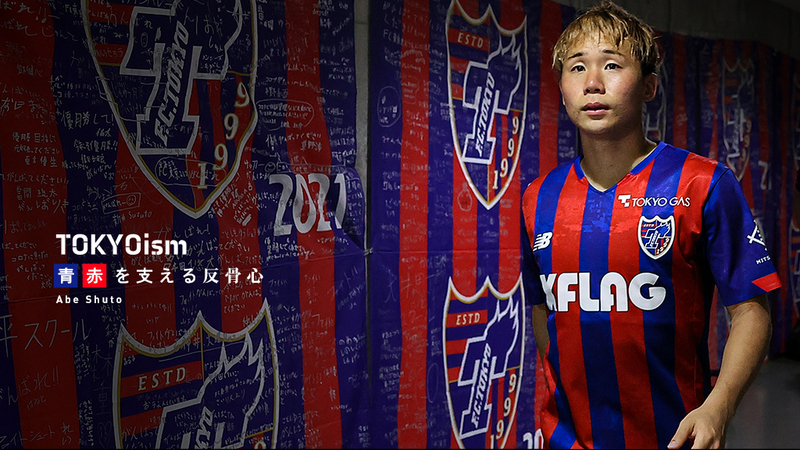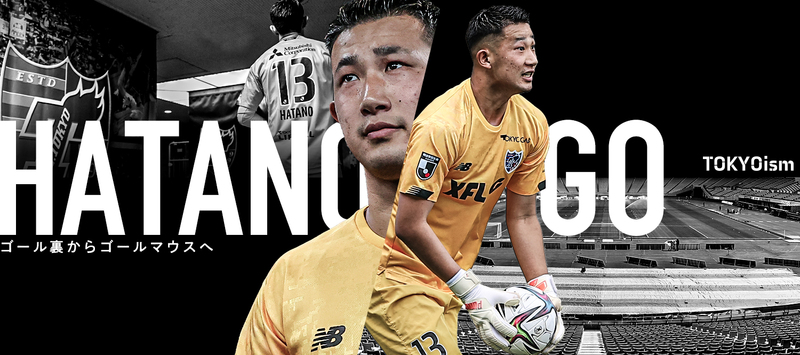There is a saying about the second-year jinx.
One of the trends seen in professional sports and the entertainment industry is that if an athlete performs well in their rookie year or breaks out with significantly better results than the previous year, their performance often declines the following year.
Shuto ABE seems to be unrelated to this jinx at first glance.
In the 2020 season, after joining as a member of the blue and red from Meiji University, he played in 27 league matches and scored 2 goals. However, in his second year as a professional this season, he has already appeared in 30 matches. Although he has not scored, it is also worth noting that his position has shifted from inside half to a deeper role as a defensive midfielder.
What stands out the most is his position within the team. He has become the central figure in the defensive midfield in place of Kento HASHIMOTO, who traveled to Russia last summer, bringing high intensity to the team. Now, the "Kenta Tokyo" without Abe is almost unimaginable.
However, the person in question was struggling.
Abe was filled with a sense of frustration at not being able to play as he envisioned and not being able to lead the team to greater heights.
"In my first year, I was fresh and went all out, but this year I've been overthinking things. I feel the expectations since Kento moved, and I definitely want to meet those expectations and go all out, but right now I'm playing as a defensive midfielder, so I have to consider the balance between offense and defense. When someone pushes forward, I need to cover, and while I'm thinking about all that, I sometimes miss the timing to move forward. On one hand, I've started to see a lot more, but on the other hand, that's also putting the brakes on myself..."
With the advice of coach Kenta HASEGAWA, I worked on sprint training using a tube this summer to acquire a higher level of power. I felt that my condition improved and my athleticism and running ability increased.
However, without being able to deliver the performance I aspire to, and with the team not achieving the desired results, the season has passed the halfway point.
It was at such a time that news that would shake Abe's heart came in.
The Conversion That Changed My Life
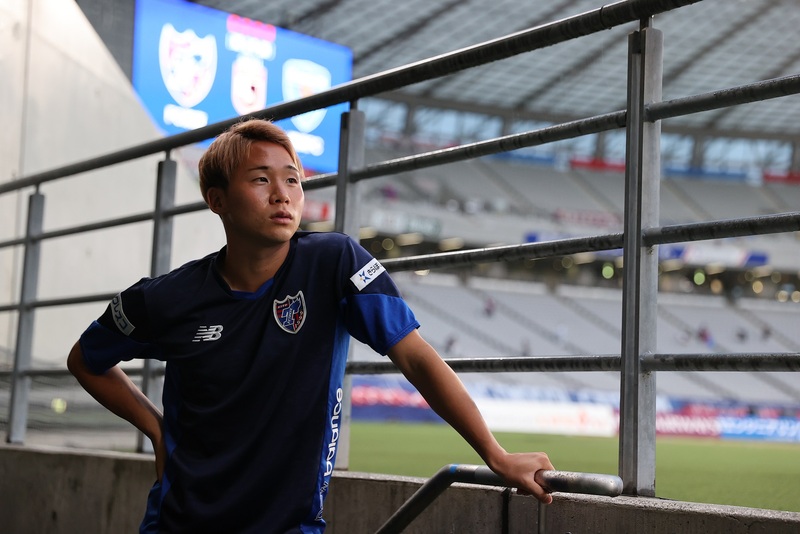
From the first year of junior high school for six years, I was fully immersed in the "Blue and Red Spirit" at FC Tokyo's academy, and during my first year of high school, I experienced winning the national championship as a key player for the Tokyo selection.
Although he did not achieve promotion to the top league, he played a key role at Meiji University, a prestigious institution in college soccer, starting from his second year. By his final year, he decided to return to his former club early. From an outsider's perspective, Abe appears to be a soccer elite.
However, he has no awareness of that at all.
"In the FC Tokyo U-15 Musashino selection, I was at the very bottom in terms of position. There were many skilled players applying, and I cleared the first, second, and third rounds one by one, and finally passed. I was also shorter, and the level of the surrounding players was high, so I was initially nervous thinking, 'Am I going to play with these players?' There were times when I thought it might be tough for me to join."
The turning point came when I was in the second year of middle school. From attacking midfielder to defensive midfielder――. My position was changed.
It was Toshiki KOIKE, the coach at the time and now the head of scouting management, who led Abe to a "new world." During his playing days, he specialized as a defensive midfielder and was affectionately known by fans and supporters as "Peru Koike." He must have felt similar qualities in Abe.
This changed Abe's football life significantly.
"Since then, I've been able to be used in every match, and I feel like that has really helped me grow."
That said, the promotion to FC Tokyo U-18 was just barely achieved.
In a tough situation where only either Abe or another person could be promoted, a hold was maintained for a while. During that time, just to be safe, I took the selection for the high school athletic association and passed, but in the end, I won the final ticket.
Having somehow climbed up a stage, Abe is establishing his playing style as a defensive midfielder.
"I think my current playing style developed when I was a first-year high school student. I was originally someone with a lot of stamina and physical ability. But I wonder why... it just naturally became my strength to take the ball away. I don't know what triggered it, but before I knew it, I had developed my current playing style."
I will not return to Tokyo
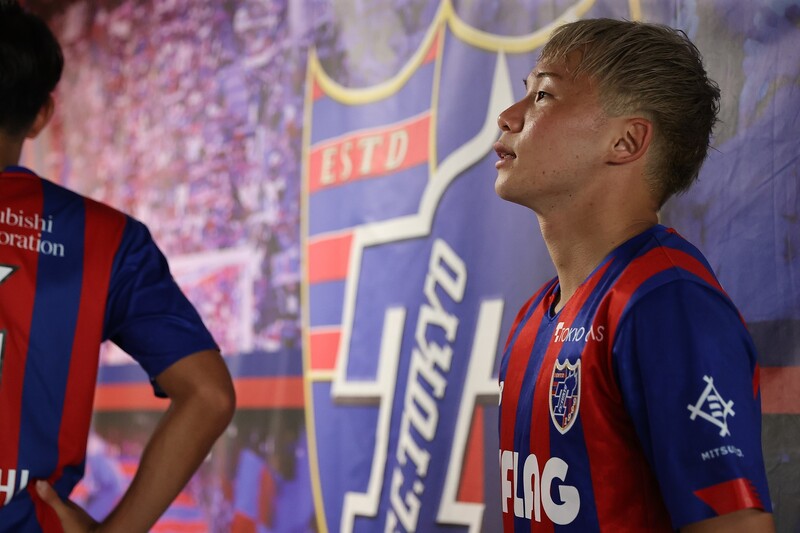
It was around this time that the love for Tokyo and the desire to become a professional grew significantly.
Originally, Hino City, where Abe lived, is the home town of Verdy. In fact, during elementary school, he often watched matches at the stadium, many of which were Verdy's games.
Nevertheless, the reason I tried out for FC Tokyo's academy was that I couldn't seem to like Verdy for some reason, but as I became a high school student and started training at Kodaira Ground, my admiration for the top team practicing next to us grew stronger.
Around this time, there were more opportunities to watch the top team's matches.
My heart soared at the players moving on the pitch of Ajinomoto Stadium illuminated by cocktail lights.
Abe was part of FC Tokyo U-18 for three years from 2013 to 2015. This was during the time when Ranko POPOVIC and Massimo FICCADENTI were in charge of the top team.
I want to play on that pitch too.
What caught Abe's attention, strengthening those feelings, was a slender player who fiercely clung to the opposing player and completely took the ball away.
Takuji YONEMOTO was shining, wasn't he? It's amazing that he can move like that and take the ball away. Since we play the same position and have similar playing styles, I thought I should take him as a model.
Starting from my second year of high school, I increased my opportunities to play, and by the time I was in my third year, I could envision myself standing on the pitch at Ajinomoto Stadium. However—.
"I thought I might be able to move up to the top team, but during the summer meeting of my senior year in high school, I was told it would be 'difficult,' and I realized it was impossible. I was really shocked. The club suggested I pursue university, asking, 'How about Meiji?' But at that point, I couldn't think about university at all."
After returning home and discussing with his parents, Abe was encouraged by the words, "Isn't it good to do your best in university?" He vowed to definitely become a professional in four years and shifted his mindset.
At the same time, there was another vow made at this moment.
I will not return to FC Tokyo.
"At that time, I think I told my parents. I absolutely wouldn't go back. I was very frustrated, so I wanted to prove myself."
However, what awaited Abe, who had begun to walk a new path with a rebellious spirit, were days of humiliation where he couldn't even make it to the bench.
The number of official matches played during my first year of university was just 1.
"Honestly, it was more shocking that I couldn't get promoted to the top. I didn't get to play in any matches throughout the year, so it was quite tough mentally."
What motivated Abe was the presence of his peers. Competing with Ryoya MORISHITA (Nagoya Grampus), Itsuki SETO (Yokohama FC), Hotaka NAKAMURA, and others who were also unable to participate in official matches, he became determined to push himself to the limit with strength training and self-practice until he was recognized.
The frustration of not being able to be promoted to the top team, the rebellious spirit to get back at FC Tokyo, and the strong desire to carve out a path in college fueled Abe.
"While supporting each other and aiming higher without giving up, I think we were in a truly wonderful environment and were blessed with great teammates. There were many passionate peers, which helped me to keep pushing forward."
As he gradually began to seize opportunities to play from the middle of his second year in university, FC Tokyo officials started to visit the venue to observe Abe's performance almost every match.
"After the match, I was approached by them. Even though I left the club, I was really happy to see how passionately they still support me. I gradually started to think that I really want to return to Tokyo."
What Tokyo cherishes in every era
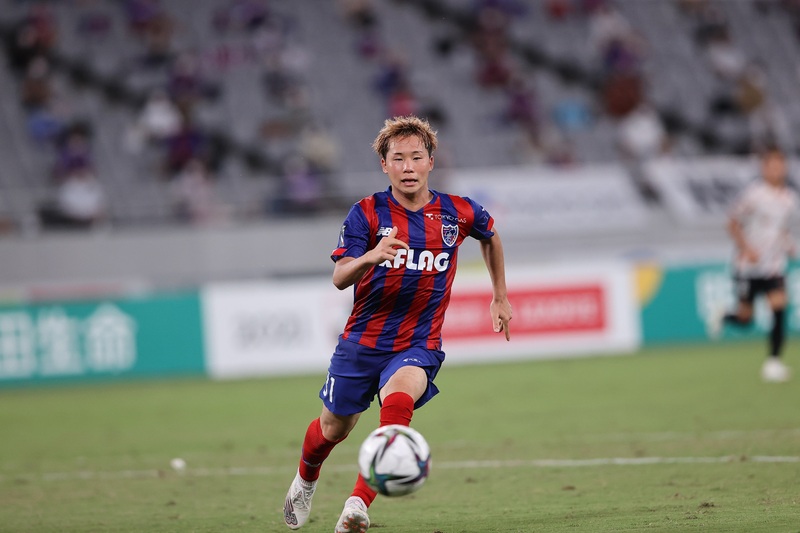
The inquiry for acquisition from FC Tokyo to Abe, who became a key player at Meiji University, was made in February 2019, just before he advanced to his fourth year.
Abe cherishes the joy of that moment deep in his heart.
"During the preseason camp in Okinawa, I was invited by the scouting management director, Yutaka ISHII, to go to a café with Kazuya KONNO. There, he said, 'I would like to make an offer.' I thought, 'Oh, is it going to be decided?'
There is no doubt that the sincerity shown in caring for me even after leaving the club has unraveled my resistance to never returning, awakening the love for Tokyo that I had locked away deep in my heart.
However, the reason for deciding to come to Tokyo was not just that.
"The fans and supporters who cheered for me during my U-18 days came to watch my college games and encouraged me by saying, 'Come back!' That made me really happy, and I thought that my playing style fits well with Tokyo's soccer. One of the reasons I believed I could succeed in Tokyo was because of that."
The term 'Tokyo soccer' does not simply refer to the style that Coach Hasegawa aspires to.
The style of football varies depending on the coach in charge. However, the underlying Tokyo DNA, which has always been valued throughout the ages and is thoroughly instilled in the academy, remains unchanged.
It is the attitude to fight, to run, and to never give up――.
That is exactly Abe's strength and what he has cherished.
"The former U-18 coach, Kazuki Sato, was very passionate, and he emphasized aspects like ball contests, work rate, and transitions in every match, which really resonated with me. My current strengths have undoubtedly developed during that time."
Abe, who fits the style of Coach Hasegawa, has left impressive results in his rookie year of the 2020 season that he can be proud of.
In the second year of this season, he is becoming an indispensable presence in the midfield. However, for Abe, who had set three goals of becoming a key player for the team aiming for the league championship and scoring 5 goals, this is not satisfactory.
A change in position to a lower row is not an excuse for still having no goals, and Abe himself understands this well.
Right now, I am consciously thinking about Sho INAGAKI, a senior from FC Tokyo U-15 Musashino and a member of Nagoya Grampus. INAGAKI missed the promotion to FC Tokyo U-18, but he worked his way up through Teikyo High School, Nippon Sport Science University, Ventforet Kofu, Sanfrecce Hiroshima, and Nagoya Grampus, ultimately reaching the Japan national team through his hard work.
"Even though Inagaki is a defensive midfielder, he has scored 8 goals in the league. I need to refine my mid-range shooting like Inagaki, and I also need to improve my coordination with Takuya AOKI, who plays alongside me as a defensive midfielder, and I have to keep pushing forward more and more."
A man who knows the world is nothing but a stimulus
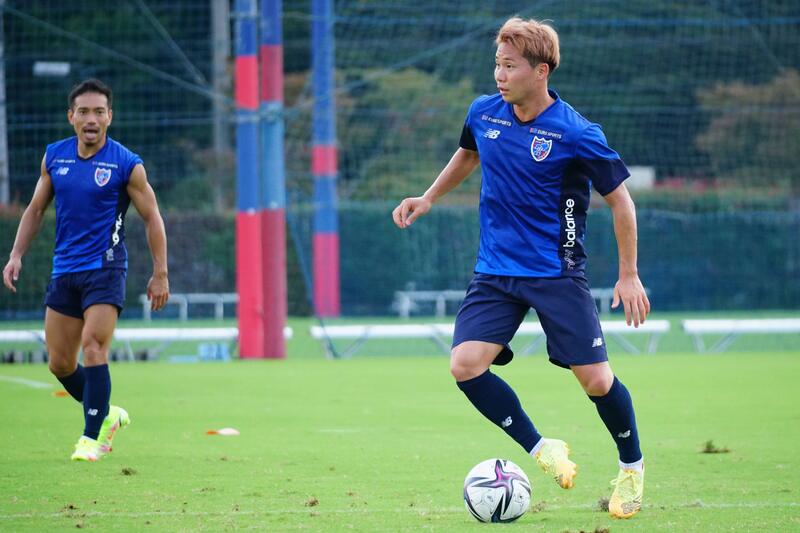
For Abe, who is facing a wall that can only be seen by those who set high goals, the return of Yuto NAGATOMO to FC Tokyo holds great significance.
The return of the senior at this timing could be said to be a gift from the soccer gods to Abe.
Without a doubt, Nagatomo, a senior from Meiji University, is a player who knows the top of the top in the world, and he is a truly indomitable man, far surpassing Abe, who has climbed up with a rebellious spirit, embodying the essence of a "bundle of defiance."
"It's just full of excitement, and there is so much to learn from everything. During the game, Yuto-kun gives me advice to create a triangle with me and the left side half player, and he encourages me by saying, 'You must never lose the second ball.' There are so many things I need to absorb, like conditioning and communication during play."
What surprised Abe the most was the communication skills. Of course, Abe had imagined the high level of 'communication ability' of his senior, who has always been a mood maker no matter which country or club he went to, whether it was Italy, Turkey, or France.
However, it exceeded my imagination significantly.
"Even during practice, they continuously shout, give instructions, and motivate us. They communicate with Brazilian players using English and Italian, conveying things that have been difficult to express until now. I am truly grateful for that; I believe that is experience."
Nagatomo, who declares to "create a strong Tokyo," firmly pointed out that "the team's atmosphere is loose." Abe has taken those words to heart.
"It's true that when Yuto came in, the atmosphere became more tense. It wasn't that it was loose, but it definitely tightened up. On the practice pitch, we've started to compete more intensely. I think it's thanks to the people who point things out that we've been able to notice these things."
Playing alongside a man who knows the world has made my goals clearer and more defined.
I want to be involved with the Japan national team
Abe had complicated feelings this summer. The U-24 Japan national team, which reached the semifinals at the Tokyo Olympics, consists of players from the same generation as Abe, who was born in 1997.
"Honestly, I couldn't really watch it properly... I had the feeling that I wanted them to do their best, but I also felt frustrated, and it became a mix of emotions where I both wanted to watch and didn't want to watch..."
It is not surprising that Abe, who has now become a key figure for FC Tokyo, harbors a rebellious spirit, believing that he is not inferior to those guys. The age-specific national teams ended with the Olympics. From now on, there is only the Japan national team without age restrictions.
The presence of senior mentors is likely significant in understanding the standards needed to achieve that goal.
"Players selected for the Japan national team often play abroad or have returned from overseas. To break into that group, I believe I need to raise my own awareness and aim for higher goals."
In every era, we have not always been at the front from the start. With frustration in our hearts, we have stepped forward, step by step, and raised the stage.
The daily efforts at Kodaira Ground are leading to a brilliant future――.
Believing so, Abe aims for title acquisition and a spot in the Japan national team.
◇Shuto ABE Profile
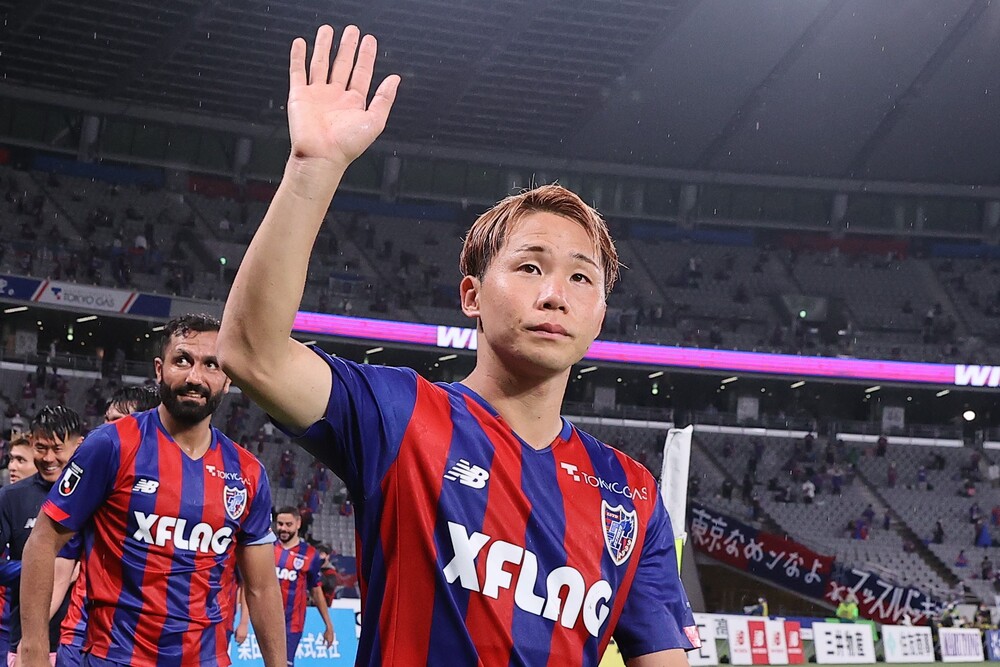
Height/Weight: 171cm/67kg
Place of Origin: Hino City, Tokyo
Career: FC Tokyo U-15 Musashi → FC Tokyo U-18 → Meiji University → FC Tokyo
Text by Atsushi Iio
Text by Atsushi Iio
Photo by Kenichi Arai
Photo by Kenichi Arai
